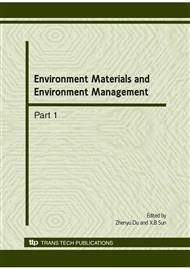p.1123
p.1128
p.1132
p.1138
p.1143
p.1147
p.1153
p.1158
p.1162
Studies of Ecological Environment Management in the New Countryside Construction Progress
Abstract:
In order to build the rural ecological civilization, and promote the building of a new socialist countryside, we must attach importance to rural environmental protection. By analyzing the water pollution, soil pollution and solid waste pollution situation in the new countryside construction progress, this paper indicate that three major reasons of the rural ecological environment multiple pollution are pollution-intensive industries rapiddly transferring to rural, excessive use of chemicals and unreasonable use of land, and finally conclude ecological and environmental protection measures: improve the rural ecological environmental protection policies, regulations and standards system; strengthen the government's role in the management of the ecological environment; establish a sound environmental management system in rural areas; and increase environmental publicity, education and training efforts.
Info:
Periodical:
Pages:
1143-1146
Citation:
Online since:
June 2010
Authors:
Keywords:
Price:
Сopyright:
© 2010 Trans Tech Publications Ltd. All Rights Reserved
Share:
Citation:


